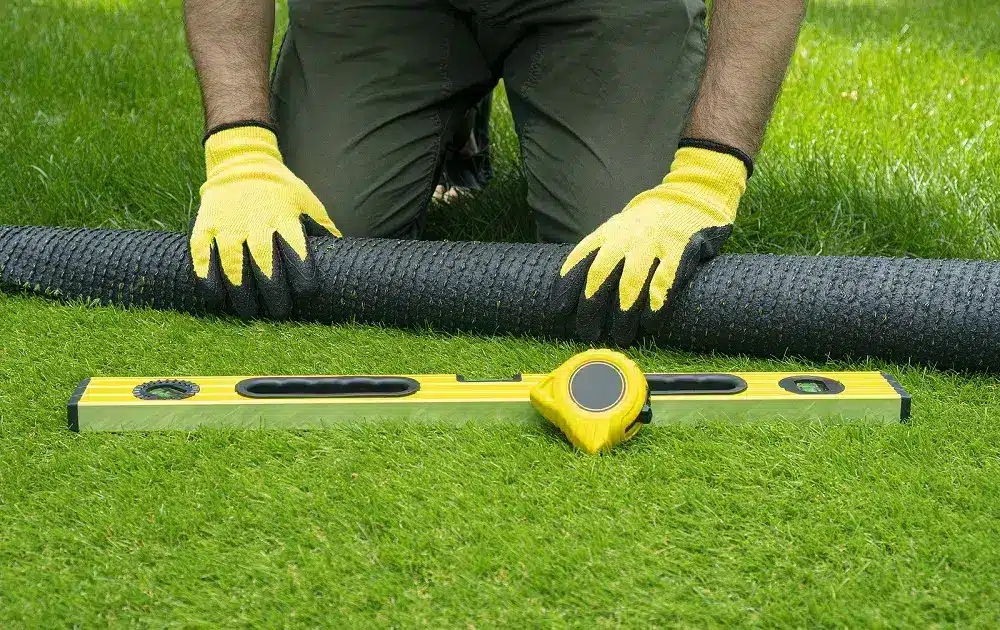How Durable Is Artificial Grass?

When it comes to choosing artificial grass for your lawn, we agree with Merriam-Webster that “durable” should mean “able to exist for a long time without significant deterioration in quality or value.” A long time in our world is around 15 years on average, which gives you a lot of bang for your buck if you ask us. We want to be honest though that durability and deterioration vary based on the type of artificial grass you choose, the amount of foot traffic your lawn gets, and the natural and not-so-natural damages that can occur (check out one of our other blogs on What Can Damage Artificial Grass). So to help you wrap your head around all of this, let’s dive into some details.
Different Types of Turf
When deciding on the type of artificial grass (or turf) you want to install for your lawn, you have three choices:
- Nylon thatch looks very natural, holds color, and has a range of thicknesses, which affects the density of the grass (thicker grass can stand up to heavier foot traffic).
- Polypropylene is specifically designed for heavy foot traffic and is extra durable, but it does not look as good as the nylon option.
- Polyethylene on the other hand looks really good, but it’s the least durable, so it really should be used in areas of minimal foot traffic.
The ultimate question for you as the customer then is what type of lawn are we planning for.
How Foot Traffic Affects Longevity
You might be thinking, if these artificial grass lawns can last upwards of 15 years, how can I plan for the foot traffic piece? Don’t stress — we’re just asking you to think through how your lawn is going to be used.
Are you a homeowner who is looking for artificial grass for your backyard? Well, to help you make a decision, do you have kids that will want to run around and play, or are you more of the “I just want my yard to look pretty while I sit outside for a BBQ” kind of person? A run-around-and-play yard owner will probably lean toward the nylon thatch option with an average thickness. It’s comfortable, looks like real grass, and will hold up to the wear and tear of multiple years of tag, cartwheels, catch, and so on. Swinging to the opposite end of the spectrum, a sit and relax with a cocktail yard owner might like the polyethylene option. You’ll get an absolutely beautiful, super green yard that’s comfortable to walk on if you want but, ultimately, is just nice to look at.
How About Business Owners?
Most businesses looking for artificial lawns are our high-traffic customers. These are lawns that are going to be dealing with people walking through them and on them five to seven days a week during standard business hours all day long for years. In looking at our options, something to think about is whether you care more about how it looks or how long it’s going to stand up to foot-stamping abuse. If you care a little more about the quality of how the grass looks, we suggest a nylon thatch with the most-durable thickness option. If you’re more concerned with the turf lasting as long as it can, then the polyethylene option might be better for you.
Ultimately though, this is the level of conversation our lawn installation specialists are here for, so you do not need to make this decision on your own. We’re just trying to get the wheels in your brain turning.
The Importance of Quality Installation
At this point, we’ve thrown you some things to think about in terms of choosing the right type of turf for your lawn project, but part of what makes our artificial lawns so durable is how we install them. When turf is installed, the ground has to be cleared and leveled out, and multiple steps of filling, packing, and more leveling need to occur to ensure a strong and stable base layer for the turf.
This initial preparation process is called “infill,” and the quality of this process dramatically impacts the longevity of your turf, potentially adding years to your investment. This is all a part of what we do. We want your yard to last just as long as you do, and that begins with a solid foundation.
Turf also has this nifty thing called a warranty, and companies do not display warranties lightly. A warranty is the best indicator of the lifespan for your lawn, and they typically range between 10 and 20 years. For high-end professional-use turf, warranties can extend even longer (remember, at the beginning, we said the average is 15 years).
There is a lot of research and data that goes into these warranty numbers, so they are pretty trustworthy.
Now that you have started to think about the best turf for your home or business, reach out to our specialist team so we can start making your vision into a reality. We’re ready to help you transform your lawn!



